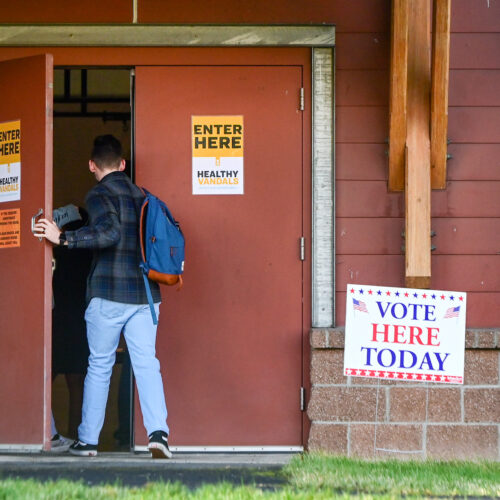
New WA law about DEI in education divides Prosser residents
Listen
(Runtime 4:05)
Read
Washington schools are now required to include Diversity, Equity and Inclusion history and contributions in their curriculum. However, in Prosser, the newly passed law is already causing divides.
Governor Jay Inslee signed Bill 5462 into law this year. The law promotes inclusive learning standards and brings in all learning resources used by students and teachers in public schools.
Prosser was one of several school district boards that earlier this year approved resolutions against the bill even before it passed.
That law requires school boards to adopt age-appropriate educational materials that include histories, contributions and perspectives of historically marginalized and underrepresented groups, including LGBTQ+ people.
Jason Rainer is the Prosser School District board president. He spoke against the bill in February during a study session.
“It’s the fact that I think, in my personal opinion, not only OSPI but our Legislature, keeps trying to whittle away the power of a school board,” said Rainer.
Noah Dempsey, school board student’s representative, disagreed.
“This is not about what’s best for every student in Prosser High School, it is about politics,” said Dempsey in an interview.
The new law mandates a screening for biased content and ensures that diversity, equity and inclusion concepts are part of each learning standard and are culturally diverse, as well.
Lura Jansen is the mother of a Prosser student.
“Every time something comes up that talks about diversity, inclusion, they’re always against it. I think that anything mentioning, specifically LGBTQ+, triggers them,” Jansen said.
Voices from the community, in favor and against the resolution, echoed in previous school district meetings.
A Prosser resident, Rachel Reese, sent a letter to the board. She said she recognizes the importance of fostering diversity and inclusion in the educational system, but introducing LGBTQ+ history may not be appropriate.
In another letter, TJ and Desiree Mains said the new requirements to include LGBTQ+ history do not align with the needs of students in Prosser.
Kimberly Starr, a retired Prosser High School teacher, said the impact of the decision goes beyond a resolution.
“My perception is that we have some board members who are trying to set policy for the district based on their religious beliefs and that concerns me,” Starr said.
Some community members questioned whether the board is responsible for reviewing and interpreting bills that come up in the Legislature.
Kimberly Casey is the Prosser School District superintendent.
“We do have a legislative rep who is on our school board. We do try and keep up on the WSSD. I would say the answer is we try to review what’s going on and know what’s going on in the Legislature,” Casey said.
People also asked why, with so many proposals focused on education, the board decided to oppose the DEI bills.
Casey said she cannot answer that question.
“I am the secretary to the board. Why they chose to review those, that’s not a decision I make, they make those decisions,” Casey said.
Casey said that a committee reviews the curriculum and instructional materials for any topic. Parents, students, teachers, and other community members are invited to participate. The board has the final decision.
She said the resolution only expressed the board’s opposition to the proposed bill, but the school district has to follow the rules of the state of Washington.
Katy Payne, the Office of Superintendent of Public Instruction executive communications director, said in a written statement, “OSPI is working on planning the implementation of all the new items impacting our public K–12 schools that were approved by the 2024 Legislature, including the implementation of Senate Bill 5462.”
Payne said, “OSPI will also be consulting with the expertise of the state’s commissions to update the tools and procedures we use in the learning standards revision and adoption process to include inclusivity and screening for biased content.”
Local school boards have the sole authority to review and approve the curriculum that will be utilized in their schools, she said.
Screening to avoid stereotyping and gender, race and other forms of bias is already part of Prosser School District policy and procedures, which are available to the public.
Kennewick, Central Valley, and Deer Park School Boards also discussed resolutions against Bill 5462.
















